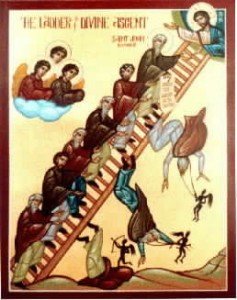 When last I shared information about the Ladder of St. John Climacus, it was about his Step 28 which is PRAYER. This step has several different sections and is one of the more lengthy Steps on his ladder. I last briefly shared thoughts about Spoken Prayer.
When last I shared information about the Ladder of St. John Climacus, it was about his Step 28 which is PRAYER. This step has several different sections and is one of the more lengthy Steps on his ladder. I last briefly shared thoughts about Spoken Prayer.
John suggests that the most helpful way to learn to pray through the services of the Church is with a prayer book. Such books give us a structure for prayer. They show us that the Eastern Church typically concludes prayers with expressing honor and praise to the Holy Trinity Who we call Father, Son and Holy Spirit. Even our prayers of supplication to the Mother of God and the saints traditionally are concluded in this manner.
Praying through prayer books is not the only form of spoken prayer. While these help us to pray as an Eastern Christian, we often find that such prayer can be dry: we end up reciting prayers without meaning them or understanding them. Certainly we should persist in saying these prayers. For the more accustomed we grow to using them, the easier it will be for these prayers to become our own and to be carried into the second stage of prayer: mental prayer.
But in addition to using set prayers, we can pray in our own words. Such prayer is by no means unacceptable. On the contrary, our own words can be the most powerful prayers of all.
Our prayers should be simple. Christ Himself warns us about verbosity and saying too much inprayer. Matthew quotes Jesus saying: “When you pray, do not use vain repetitions as the heathen do”. Why? Because “your Father knows the things you have need of before you ask Him.”
Notwithstanding the above, it is not easy to spend more than a few moments in prayer with limited words. So when we are beginning to learn how to pray, we should limit our spontaneous prayers. More to follow.
